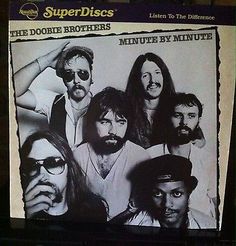
After the band's split, McDonald pursued a successful solo career, while Simmons released one unsuccessful solo record. Early in 1982, the Doobie Brothers announced they were breaking up after a farewell tour, which was documented on the 1983 live album Farewell Tour. Following his departure, the Doobies released their most successful album, Minute by Minute (1978), which spent five weeks at number one on the strength of the number one single "What a Fool Believes." Hartman and Baxter left the group after the album's supporting tour, leaving the Doobie Brothers as McDonald's backing band.įollowing a year of auditions, the Doobies hired ex-Clover guitarist John McFee, session drummer Chet McCracken, and former Moby Grape saxophonist Cornelius Bumpus, and released One Step Closer (1980), a platinum album that produced the Top Ten hit "Real Love." During the tour for One Step Closer, McCracken was replaced by Andy Newmark. Johnston left the band after the album's release to pursue an unsuccessful solo career. In 1977, they released Livin' on the Fault Line, which was successful without producing any big hits. Later that year, the group released the hits compilation The Best of the Doobies. The new sound was showcased on 1976's Takin' It to the Streets, a collection of light funk and jazzy pop that resulted in a platinum album. Although it peaked at number four, Stampede wasn't as commercially successful as its three predecessors, and the group decided to let McDonald and Baxter, who were now official Doobies, revamp the band's light country-rock and boogie. Prior to the album's spring release, Johnston was hospitalized with a stomach ailment and was replaced for the supporting tour by keyboardist/vocalist Michael McDonald, who had also worked with Steely Dan. Baxter officially joined the Doobie Brothers for 1975's Stampede. Keith Knudsen replaced Hossack as the group's second drummer for 1974's What Were Once Vices Are Now Habits, which launched their first number one single, "Black Water," and featured heavy contributions from former Steely Dan member Jeff "Skunk" Baxter. The Captain and Me (1973) was even more successful, spawning the Top Ten hits "Long Train Runnin'" and "China Grove." Driven by the singles "Listen to the Music" and "Jesus Is Just Alright," Toulouse Street became the group's breakthrough. Afterword, Shogren was replaced by Tiran Porter and the group added a second drummer, Michael Hossack, for 1972's Toulouse Street. The band's eponymous debut was ignored upon its 1971 release. Soon, the Doobies earned a strong following throughout Southern California, especially among Hell's Angels, and they were signed to Warner Bros.

Eventually, the quartet decided to form a group, naming themselves the Doobie Brothers after a slang term for marijuana. After Pud collapsed in 1969, the pair began jamming with bassist Dave Shogren and guitarist Patrick Simmons. The roots of the Doobie Brothers lie in Pud, a short-lived California country-rock band in the vein of Moby Grape featuring guitarist/vocalist Tom Johnston and drummer John Hartman. They would continue to tour with a rotating lineup into the 2020s, with the core trio of Johnston, John McFee, and Patrick Simmons - the guitarist who wrote and sang "Black Water," the one constant member in the band's history - recording the occasional album of new material, such as 2021's Liberte. "Listen to the Music," "Long Train Runnin'," and "China Grove" were early-'70s hits all written and sung by Tom Johnston, the guitarist who was slowly replaced as frontman by Michael McDonald, a husky-voiced keyboardist who wrote and sang "Takin' It to the Streets," "It Keeps You Runnin'," and "Minute by Minute," along with "What a Fool Believes." McDonald was drafted into the Doobies to help support the ailing Johnston and he wound up steering the band toward slick, soulful soft rock - the kind of music that would retroactively be dubbed "yacht rock." McDonald's hits with the Doobie Brothers propelled him into solo stardom and he'd re-enter the band's orbit after the group reunited with Johnston as the frontman in 1989. The Doobies racked up numerous other hits in both incarnations, songs that wound up as classic rock perennials.

Subsequent reunions and decades as a successful live attraction blurred the divide between the rambling "Black Water" and funky "What a Fool Believes," the band's two number one hits on Billboard. The Doobie Brothers had two distinct phases during their 1970s peak, evolving from boogie rockers with a penchant for mellow good vibes into a smooth blue-eyed soul outfit.


 0 kommentar(er)
0 kommentar(er)
